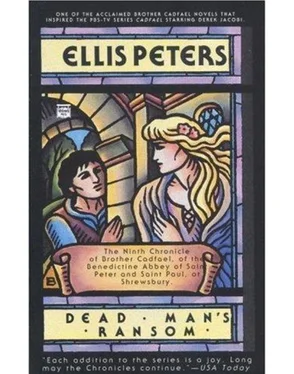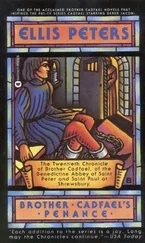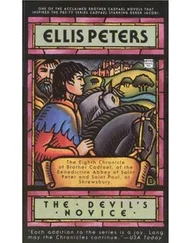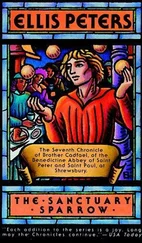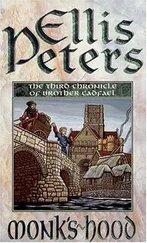Ellis Peters - Dead Man's Ransom
Здесь есть возможность читать онлайн «Ellis Peters - Dead Man's Ransom» весь текст электронной книги совершенно бесплатно (целиком полную версию без сокращений). В некоторых случаях можно слушать аудио, скачать через торрент в формате fb2 и присутствует краткое содержание. Жанр: Исторический детектив, на английском языке. Описание произведения, (предисловие) а так же отзывы посетителей доступны на портале библиотеки ЛибКат.
- Название:Dead Man's Ransom
- Автор:
- Жанр:
- Год:неизвестен
- ISBN:нет данных
- Рейтинг книги:5 / 5. Голосов: 1
-
Избранное:Добавить в избранное
- Отзывы:
-
Ваша оценка:
- 100
- 1
- 2
- 3
- 4
- 5
Dead Man's Ransom: краткое содержание, описание и аннотация
Предлагаем к чтению аннотацию, описание, краткое содержание или предисловие (зависит от того, что написал сам автор книги «Dead Man's Ransom»). Если вы не нашли необходимую информацию о книге — напишите в комментариях, мы постараемся отыскать её.
Dead Man's Ransom — читать онлайн бесплатно полную книгу (весь текст) целиком
Ниже представлен текст книги, разбитый по страницам. Система сохранения места последней прочитанной страницы, позволяет с удобством читать онлайн бесплатно книгу «Dead Man's Ransom», без необходимости каждый раз заново искать на чём Вы остановились. Поставьте закладку, и сможете в любой момент перейти на страницу, на которой закончили чтение.
Интервал:
Закладка:
Ellis Peters
Dead Man’s Ransom
Chapter One
ON THAT DAY, which was the seventh of February of the year of Our Lord 1141, they had offered special prayers at every office, not for the victory of one party or the defeat of another in the battlefields of the north, but for better counsel, for reconciliation, for the sparing of blood-letting and the respect of life between men of the same country—all desirable consummations, as Brother Cadfael sighed to himself even as he prayed, but very unlikely to be answered in this torn and fragmented land with any but a very dusty answer. Even God needs some consideration and support from his material to make reasoning and benign creatures of men.
Shrewsbury had furnished King Stephen with a creditable force to join his muster for the north, where the earls of Chester and Lincoln, ambitious half-brothers, had flouted the king’s grace and moved to set up their own palatine, and with much in their favour, too. The parish part of the great church was fuller than usual even at the monastic offices, with anxious wives, mothers and grandsires fervent in praying for their menfolk. Not every man who had marched with Sheriff Gilbert Prestcote and his deputy, Hugh Beringar, would come home again unscathed to Shrewsbury. Rumours flew, but news was in very poor supply. Yet word had filtered through that Chester and Lincoln, long lurking in neutrality between rival claimants for the crown, having ambitious plans of their own in defiance of both, had made up their minds in short order when menaced by King Stephen’s approach, and sent hotfoot for help from the champions of his antagonist, the Empress Maud. Thus committing themselves for the future, perhaps, so deep that they might yet live to regret it.
Cadfael came out from Vespers gloomily doubting the force, and even the honesty, of his own prayers, however he had laboured to give them heart. Men drunk with ambition and power do not ground their weapons, nor stop to recognise the fellow-humanity of those they are about to slay. Not here—not yet. Stephen had gone rampaging north with his muster, a huge, gallant, simple, swayable soul roused to rage by Chester’s ungrateful treachery, and drawn after him many, and many a wiser and better balanced man who could have done his reasoning for him, had he taken a little more time for thought. The issue hung in the balance and the good men of Shropshire were committed with their lord. So was Cadfael’s close friend, Hugh Beringar of Maesbury, deputy sheriff of the shire, and his wife must be anxiously waiting there in the town for news. Hugh’s son, a year old now, was Cadfael’s godson, and he had leave to visit him whenever he wished, a godfather’s duties being important and sacred. Cadfael turned his back on supper in the refectory, and made his way out of the abbey gates, along the highway between the abbey mill and mill-pond on his left, and the belt of woodland sheltering the main abbey gardens of the Gaye on his right, over the bridge that spanned the Severn, glimmering in the wintry, starlit frost, and in through the great town gate.
There were torches burning at the door of Hugh’s house by Saint Mary’s church and beyond, at the High Cross, it seemed to Cadfael that there were more folk abroad and stirring than was usual at this hour of a winter evening. The faintest shiver of excitement hung in the air, and as soon as his foot touched the doorstone Aline came flying to the doorway with open arms. When she knew him her face remained pleased and welcoming, but nonetheless lost in an instant its special burning brightness.
“Not Hugh!” said Cadfael ruefully, knowing for whom the door had been thus thrown wide. “Not yet. Is there news, then? Are they homing?”
“Will Warden sent word an hour ago, before the light was quite gone. They sighted steel from the towers, a good way off then, but by now they must be in the castle foregate. The gate’s open for them. Come in to the fire, Cadfael, and stay for him.” She drew him in by the hands, and closed the door resolutely on the night and her own aching impatience. “He is there,” she said, catching in Cadfael’s face the reflection of her own partisan love and anxiety. “They caught his colours. And the array in good order. Yet it cannot be quite as it went forth, that I know.” No, never that. Those who go forth to the battle never return without holes in their ranks, like gaping wounds. Pity of all pities that those who lead never learn, and the few wise men among those who follow never quite avail to teach. But faith given and allegiance pledged are stronger than fear, thought Cadfael, and that, perhaps, is virtue, even in the teeth of death. Death, after all, is the common expectation from birth. Neither heroes nor cowards can escape it.
“He’s sent no word ahead,” he asked, “of how the day went?”
“None. But the rumour is it did not go well.” She said it firmly and freely, putting back with a small hand the pale gold hair from her forehead. A slender girl, still only twenty-one years old and mother of a year old son and as fair as her husband was black-avised. The shy manner of her girlhood years had matured into a gentle dignity. “This is a very wanton tide that flows and carries us all, here in England,” she said. “It cannot always run one way, there must be an ebb.” She was brisk and practical about it, whatever that firm face cost her. “You haven’t eaten, you can’t have stayed for supper,” she said, the housewife complete. “Sit there and nurse your godson a little while, and I’ll bring you meat and ale.”
The infant Giles, formidably tall for a year old when he was reared erect by holding to benches and trestles and chests to keep his balance, made his way carefully but with astonishing rapidity round the room to the stool by the fireside, and clambered unaided into Cadfael’s rusty black lap. He had a flow of words, mostly of his own invention, though now and then a sound made sudden adult sense. His mother talked to him much, so did her woman Constance, his devoted slave, and this egg of the nobility listened and made voluble response. Of lordly scholars, thought Cadfael, rounding his arms to cradle the solid weight comfortably, we can never have too many. Whether he takes to the church or the sword, he’ll never be the worse for a quick and ready mind. Like a pair of hound puppies nursed in the lap, Hugh’s heir gave off glowing warmth and the baked bread scent of young and untainted flesh.
“He won’t sleep,” said Aline, coming with a wooden tray to set it on the chest close to the fire, “for he knows there’s something in the wind. Never ask me how, I’ve said no word to him, but he knows. There, give him to me now, and take your meal. We may have a long wait, for they’ll see all provided at the castle before ever Hugh comes to me.”
It was more than an hour before Hugh came. By then Constance had whisked away the remains of Cadfael’s supper, and carried off a drooping princeling, who could not keep his eyes open any longer for all his contrivances, but slept in sprawled abandon in her arms as she lifted him. For all Cadfael’s sharp hearing, it was Aline who first pricked up her head and rose, catching the light footsteps in the doorway. Her radiant smile faltered suddenly, for the feet trod haltingly.
“He’s hurt!”
“Stiff from a long ride,” said Cadfael quickly. “His legs serve him. Go, run, whatever’s amiss will mend.” She ran, and Hugh entered into her arms. As soon as she had viewed him from head to foot, weary and weather-stained as he was, and found him whole, whatever lesser injuries he might be carrying, she became demure, brisk and calm, and would make no extravagant show of anxiety, though she watched him every moment from behind the fair shield of her wifely face. A small man, lightly built, not much taller than his wife, black-haired, black- browed. His movements lacked their usual supple ease, and no wonder after so long in the saddle, and his grin was brief and wry as he kissed his wife, drove a fist warmly into Cadfael’s shoulder, and dropped with a great, hoarse sigh on to the cushioned bench beside the fire, stretching out his booted feet gingerly, the right decidedly with some pain. Cadfael kneeled, and eased off the stiff, ice- rimmed boots that dripped melting rivulets into the rushes.
Читать дальшеИнтервал:
Закладка:
Похожие книги на «Dead Man's Ransom»
Представляем Вашему вниманию похожие книги на «Dead Man's Ransom» списком для выбора. Мы отобрали схожую по названию и смыслу литературу в надежде предоставить читателям больше вариантов отыскать новые, интересные, ещё непрочитанные произведения.
Обсуждение, отзывы о книге «Dead Man's Ransom» и просто собственные мнения читателей. Оставьте ваши комментарии, напишите, что Вы думаете о произведении, его смысле или главных героях. Укажите что конкретно понравилось, а что нет, и почему Вы так считаете.
